**Impact of Lawsuit on School Districts’ Handling of Complaints**
A lawsuit filed against the West Contra Costa Unified School District has the potential to set a new precedent for how school districts in California handle and respond to complaints filed by students, educators, and community members. The civil rights law firm Public Advocates brought the lawsuit against the district for failing to address issues raised in “Williams complaints” within the required time frame. These complaints, which were filed by teachers, students, and parents, primarily centered around poor building conditions at Stege Elementary School. The lawsuit alleges that the district did not take timely action on nearly 50 complaints filed since June 2023, including three related to teacher vacancies.
**Historical Context: Williams v. California Settlement**
The lawsuit against West Contra Costa Unified School District is significant as it is the first district in the state to be sued under the Williams v. California settlement in 2004. This landmark case established the Williams complaint process, ensuring that all California public school students have access to textbooks, safe schools, and qualified teachers. Public Advocates, the same law firm that led the charge in the Williams case 20 years ago, is now seeking to uphold the standards set by the settlement and prevent the unlawful practice of filling full-time teacher positions with rolling substitutes.
**Enforcing Compliance Through Legal Action**
Dane Shikman, an attorney with Munger, Tolles, & Olson LLP, emphasized the importance of districts understanding that the Williams complaint process can be enforced by the courts. He stated that districts can be subject to a court order if they fail to abide by the required process. Public Advocates attorney Karissa Provenza expressed hope that the lawsuit against West Contra Costa Unified School District would set a precedent for other districts to comply with the Williams complaint process and address issues raised by stakeholders.
The lawsuit alleges that West Contra Costa Unified School District failed to respond to the 45 building condition complaints at Stege Elementary School for six months, only taking action after repeated reminders from plaintiffs’ attorneys. The complaints detailed concerning issues such as moldy walls, inoperable windows, extreme classroom temperatures, and hazardous materials like lead and asbestos. Despite acknowledging the dangerous conditions at Stege, district officials reportedly did not provide a substantive response within the required timeline.
**Implications for Students and Educators**
The inadequate response to complaints at Stege Elementary School highlights the impact on students and educators. Sam Cleare, a teacher at Stege and one of the complainants in the lawsuit, described the challenging learning environment caused by the poor building conditions. She noted that extreme heat, mold, and broken facilities made it difficult for students to focus and learn effectively. Cleare’s decision to leave her position at Stege for a role with the teachers union reflects the broader challenges faced by educators in such environments.
The lawsuit also addressed the issue of teacher vacancies within the district. While officials responded to complaints about vacant positions, they reportedly failed to fill the roles within the required time frame. This led to a reliance on substitutes, which the lawsuit deemed unlawful for long-term teaching assignments. The lack of permanent teachers in classrooms not only impacted student learning but also contributed to instability and inconsistency in educational experiences.
**Addressing Systemic Challenges in Education**
The lawsuit against West Contra Costa Unified School District sheds light on broader systemic challenges within the education system. The reliance on substitutes, delays in addressing complaints, and failure to provide permanent, qualified teachers all contribute to a crisis in the district. The impact is particularly significant in schools serving high-need communities, where students are disproportionately affected by inadequate resources and staffing.
Public Advocates’ efforts to hold districts accountable for complying with the Williams complaint process are crucial in ensuring that all students have access to quality education. By enforcing standards for textbooks, safe schools, and qualified teachers, the lawsuit aims to improve learning environments and opportunities for students across California. As the legal proceedings unfold, the outcome of this case could have far-reaching implications for how school districts handle complaints and prioritize student well-being.




















